Background to Flourished Minds
Flourished Minds is an award-winning social enterprise dedicated to supporting the social and emotional well-being of children and young people. Flourished Minds focuses on enhancing the mental health of students in primary and secondary schools through individual transformational life coaching.
These are quotes from 4 students in Year 9 at The Co-Op Academy Grange in Leeds who attended the Flourished Minds coaching session supported by Kloodle.
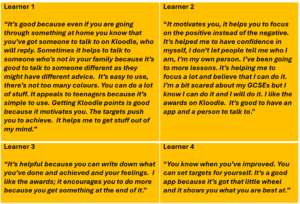
With a strong track record in deprived communities and addressing multiple barriers to success, Flourished Minds’ mission is to equip young people with the skills and resilience needed to navigate life’s challenges.
 Through their work with headteachers and their experience in schools in Bradford and Leeds, Flourished Minds recognises the urgent need for support services. However, children’s support services in Bradford and Leeds have been dramatically reduced, and in deprived communities there are added pressures, e.g. lack of extracurricular activities, poorer job opportunities etc., which exacerbate the situation, as reduced resources leave vulnerable children without proper assistance just when they need it most, impacting their academic achievement and overall well-being. This also adds stress to already overworked school staff and anxious parents, and has a negative impact on the local community and future opportunities for the region’s young people.
Through their work with headteachers and their experience in schools in Bradford and Leeds, Flourished Minds recognises the urgent need for support services. However, children’s support services in Bradford and Leeds have been dramatically reduced, and in deprived communities there are added pressures, e.g. lack of extracurricular activities, poorer job opportunities etc., which exacerbate the situation, as reduced resources leave vulnerable children without proper assistance just when they need it most, impacting their academic achievement and overall well-being. This also adds stress to already overworked school staff and anxious parents, and has a negative impact on the local community and future opportunities for the region’s young people.
Interventions
The school selects which students require support from the Flourished Minds’ coaches. The individuals are usually at risk of exclusion due to absenteeism, mainly because of ‘internal truancy’, or a wide range of behavioural issues; often this is related to anxiety, for example, some students become very stressed about the importance of the looming GCSEs and the potential impact on their life chances, or, in some cases, it is just that the student finds mainstream learning difficult and would benefit from one-to-one coaching. Through coaching interventions, these students are able to develop greater confidence, self-esteem, and resilience.
How Does The Coaching Work?
Flourished Minds coaches create a safe and confidential space for students to express themselves freely and identify obstacles hindering their progress. Through effective coaching techniques, students are equipped with tools to feel empowered and ready for positive change. Sessions focus on building confidence, self-esteem, and self-belief, while also helping students recognise their strengths and develop essential life skills. Coaches work with students to explore and overcome fears and worries, fostering resilience and helping them reach their fullest potential. Each week, students receive up to one hour of personalised coaching tailored to their specific needs. Sessions are interactive, strength-based, and enjoyable, led by accredited professional life coaches experienced in supporting children and students. All coaches undergo regular safeguarding training and hold enhanced DBS certificates, ensuring a safe and supportive environment for students’ growth and development.

The coaches at Flourished Minds understand the difficulties students face during ‘transitions’, particularly the high school transition, which can lead to decreased confidence and increased anxiety as their routines and friendships are fundamentally disrupted. This can often manifest itself as challenging behaviour from the students or absenteeism. These are two main issues affecting children’s academic achievements and staff well-being.
The Intervention Process
The process, see below, runs from referral forms completed by the school outlining the issues surrounding the intervention, right the way through to the end of the programme between 6 to 12 weeks later, when there is feedback and the students present their goals to teachers and parents at a celebratory event.
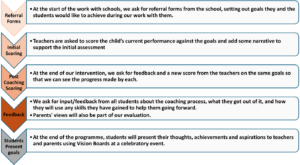
The process is currently based on hard copy, physical workbooks which are used during the coaching, collated only by the coach. However, Flourished Minds and school staff are aware that a digital solution has advantages, especially in the world of children who are invariably ‘digital natives’.
Using Kloodle, The Digital Skills’ Development Platform, At The Co-op Academy Grange
A pilot using the digital platform Kloodle was arranged at The Co-op Grange School in Leeds, with a group of students who had been identified as having specific behavioural issues, such as not turning up for lessons, and were in danger of being excluded from school.
The Kloodle digital platform is an ideal tool to use to track and measure the progress of each student, demonstrating the positive impact of coaching on their behaviour and academic performance.
How Kloodle Supports the Intervention
Kloodle’s digital platform plays a crucial role in coaching interventions. It allows students to capture and reflect on their progress throughout the programme, creating a portfolio of evidence that showcases their growth and development, which they can refer back to in the future and add to in order to develop their character and skills further.
Reflection is a very powerful component of the process as children think more deeply about identifying character traits and then how to develop them. Personal reflections are added to Kloodle, when students can consider how their character has evolved. Ultimately, they can keep their profiles for life!
Teachers and parents can also contribute to students’ reflections, providing valuable feedback and guidance along the way. This can be done remotely and instantly, saving time and being more efficient. By using Kloodle, the progress made or what’s termed the ‘distance travelled’ by each student over the term of the coaching intervention can be effectively measured and the impact of the coaching on their well-being and academic success can be demonstrated.
Parental Involvement
The parents of the group of students were given logins so that they could see and support the progress of their children, which encourages the parents to be involved in the child’s development.
Tools In The Kloodle Kitbag
Kloodle Profile and Awards
Each student has their own Kloodle profile to which they upload evidence of skills’ development through posting about activities and reflections. The experiences and character development can be captured by being recorded on Kloodle. Learners do this by uploading photos, videos and blogs to their Kloodle profile, tagging in the skills they are honing as part of any activity.
There are 18 different skills which Flourished Minds try to develop, and these are illustrated in the skills wheel you can see below; this includes skills such as problem-solving, communication and resilience. This skills’ development is scaffolded by targets which the coaches can pre-agree with the student and set through Kloodle. An example could be ‘communication’, set because the young person has struggled to communicate effectively with teachers and peers; by communicating well during the coaching period and posting about the experience, this can result in an ‘Award’ being granted for communication. Successful completion of tasks leads to granted Awards being visible on the Kloodle profile, as per the profile below. The coach can also add feedback to the posts for encouragement or to make suggestions for improvement.
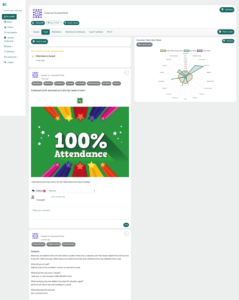
This has had the effect of building confidence and understanding of the importance of the skills.
The first phase at the Co-op Grange School was a series of weekly targets, e.g. the student is expected to turn up on time. The coach verifies through Kloodle that the targets have been met by celebrating and acknowledging the fact on the student’s Kloodle profile.
If the student does not meet the target, then a new target is set for the next week and the student is asked to make reflections on why they didn’t meet the target.
On the whole, targets were met and the coaches noted that the positive reinforcement of having acknowledgement and praise, made the students ‘proud’ and keen to want to talk and write about their ‘success’ more.
Surveys
The students took part in surveys through Kloodle where they were asked to rate their skills on a scale of, say, 1 to 10 at various intervals during the 12-week intervention period. The children completed the survey on a regular basis to check their understanding of and demonstrate their skills’ development.
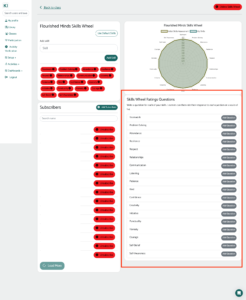
In future, surveys will be used more to check that the students understand the meaning of the skills’ nomenclatures, awareness of what they mean and understanding of their importance in the context of life. This way the coaches can receive instant feedback on whether there are any blockages in the process, due to lack of understanding or jargon.
Management Tools
There is a dashboard which teachers and coaches can access:
- showing a suite of data and charts including the numbers of participants by activity and by time period.
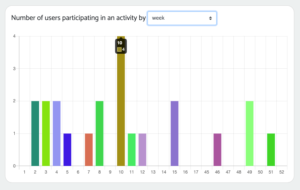
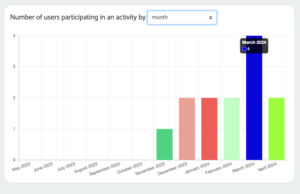
- displaying a leaderboard to show at a glance which children have completed the posts relating to skills’ development and made the most reflections. Points are awarded for posts and reflections to encourage participation.
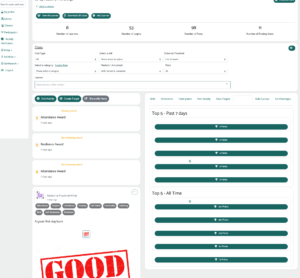
- highlighting the quality of the posts via charts, for example below, which shows how many of the reflections have been rated highly by the coaches; this can be a measure of the quality of the posts.
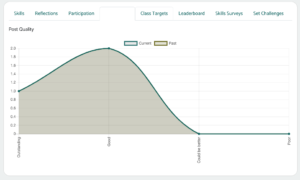
Outcomes
It is planned that all of this information is presented to school management in a session at the end of the programme to demonstrate the distance travelled and the engagement and improvement in the behaviour of the students. The ‘value added’ over the intervention period can be shown by comparing how the students, teachers and coaches rate the young peoples’ skills against 12 weeks ago when the intervention started. This can be collated for the whole group of children who are being coached and so a group skills’ wheel showing the distance travelled can be compiled as below.
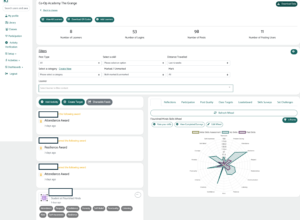
In this specific case study at The Grange, the coach felt that by using Kloodle the students better understood what their skills and emotions are about. The impact is that the students developed more self-awareness and had more self-belief. As they could see the improvements, it felt more tangible. The digital representation of this intervention, crucially, lives on beyond this coaching programme, to be expanded on or continued by other mentors in the future.
Summary of Kloodle’s Role
Unravelling the conditioning to being told off, excluded and made to feel unvalued takes a lot of care and investment. The crux of this project was to demonstrate how even just a short amount of dedicated attention to a young person’s needs coupled with positive reinforcement and reflection can be transformative. The next crucial step is to make it long lasting. This is where Kloodle can add the real value.
Kloodle plays a pivotal role in Flourished Minds’ coaching process by providing a digital platform for tracking and measuring student progress and ensuring longevity beyond the coaching intervention. Through Kloodle, students can capture and reflect on their journey, documenting their growth and development in a digital portfolio and gaining a deeper understanding and self-awareness of their skills and emotions. Kloodle also allows for remote collaboration between students, coaches, teachers, and parents, enhancing communication and support throughout the intervention. Furthermore, Kloodle’s tools, such as surveys and management dashboards, provide valuable data and insights to measure the effectiveness of the coaching programme, enabling Flourished Minds to demonstrate the positive impact of their interventions on students’ well-being and academic success.
Flourished Minds’ coaching of the individual, through Kloodle, can effectively measure and demonstrate the transformative impact, however small or large, of their coaching interventions on students’ lives.

